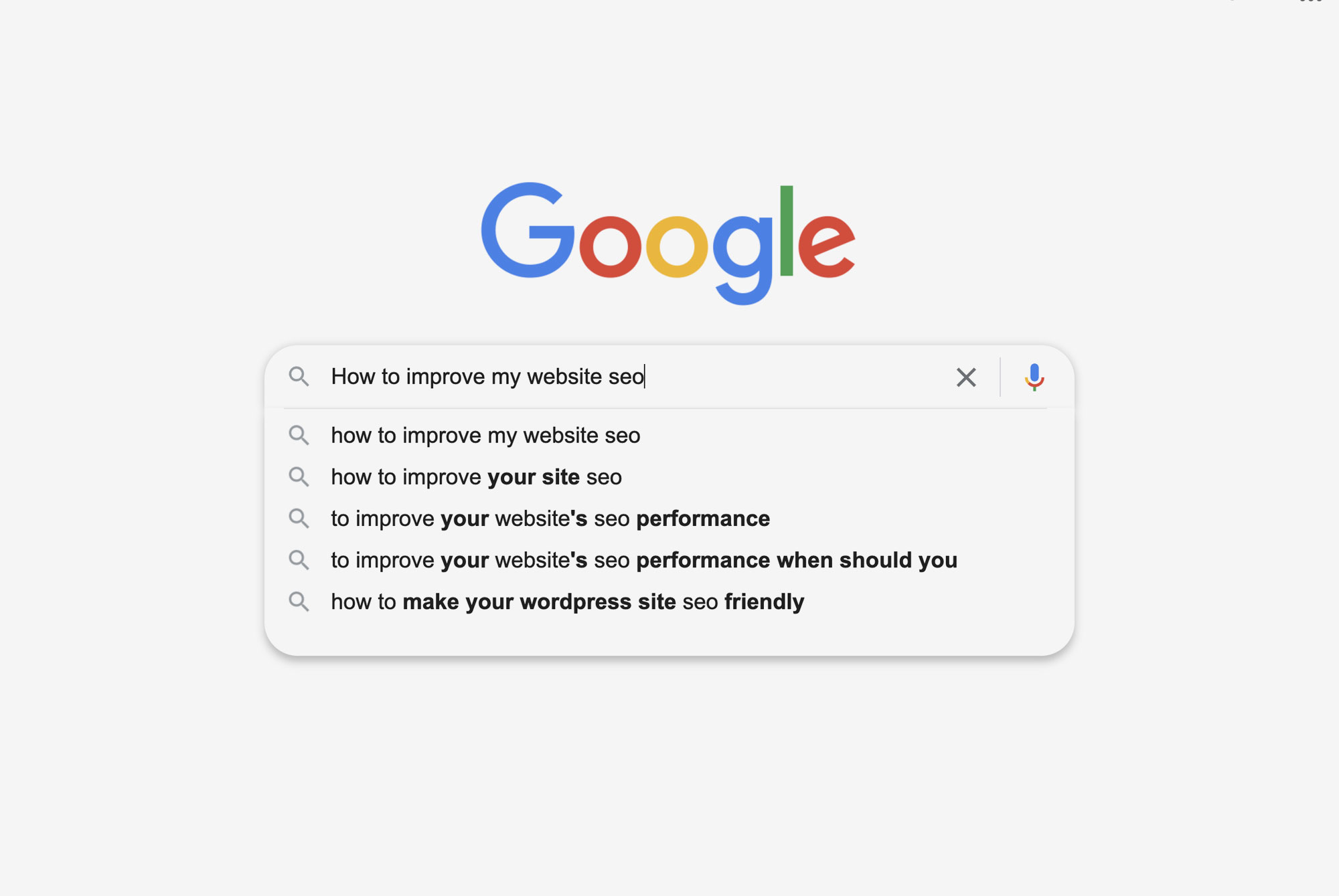 Kate Andersen |
08.31.22 |
9 min read
Kate Andersen |
08.31.22 |
9 min read The Truth About SEO for Small Businesses

As a small business owner, you know how important it is to generate traffic through your website. Your online presence can play a significant role in making the phone ring and your email sing with leads. Along the way, you may have also learned that search engine optimization (SEO) is one of the best ways for people to find your website. While that's true, we want to set the right expectations around SEO and how it works so you have the full story.
Why Is It Important to Understand SEO?
Our studio does a lot of work with small businesses thanks to the growing popularity of our website development tool. The more conversations we have with them, the more we realize how many misconceptions there are around SEO. We've also been floored by the amount of money people have been paying SEO "experts" to optimize a site with only a few pages of content.
Most of the time, a small business owner doesn't understand what they're paying for or how it works, so they end up getting scammed. We believe everyone should understand where their hard-earned money is going. We want you to know the truth about SEO, feel empowered with information, and not get ripped off.
What Are People Spending on SEO?
According to a survey of 1,200 business owners and over 350 agencies, freelancers, and consultants, the average SEO cost for small businesses in the United States is $2,500 - $5,000/month. That's a crazy amount of money, in our opinion. What's interesting is the number one reason people switch SEO providers is because they're unhappy with results. Digging in further, people are dissatisfied with results because of a lack of understanding. SEO companies don't educate their clients about what they're actually doing or clearly talk about expectations.
Many clients assume SEO works like paid advertising, so they expect an immediate return on every dollar they invest. It's no wonder people are confused and upset. In reality, SEO is a long-term strategy that takes consistent work over months or even years to see significant results.
Let's Cover Some Basics
SEO is essentially a strategy that helps people find your website when they're using a search engine like Google. From Google's point of view, its only goal is to provide the most relevant answers or information. To make this happen, the engine analyzes two factors: relevancy and authority.
There first needs to be relevancy between the search query and the content on a web page. This is assessed by various things like keywords and clarity of messaging. Then, authority is measured by a website's popularity. Google assumes that the more popular a page or website is, the more valuable the content. In turn, it will send more people in that direction. There are several ways a company can boost its website's performance in terms of relevancy and authority, and that's where SEO steps in.
SEO uses a combination of on-page and off-site tactics. On-page SEO includes the content on a website and how well it's written, keywords, tagging of images and pages, and the architecture of the site. Off-site SEO includes things like backlinks from other reputable sources, domain age, domain and page authority, geography, and bounce rates. All of these factors work together to impact your overall SEO ranking. It's a lot like running in a cross-country meet. The more great runners you have on your team, the better you'll score in the overall race. And, you really can't cheat your way to the top, which leads us to five common misconceptions we hear almost daily.
Misconception #1: You can pay to get your site ranked higher on Google
SEO can only impact the organic traffic coming to your site. You can't pay to get your site ranked higher on Google, unless it's an ad. That's called Paid Search, which targets people who are searching for keywords related to your business through ads.
The most noticeable difference between SEO and Paid Search is where the results appear on the Search Engine Results Page (SERP). The top four paid search results appear at the top of the SERP, followed by the top SEO results. You have to earn your way to the top of the organic list using SEO best practices. Companies have tried to find ways to outsmart the system with keyword stuffing, fake backlinks, and other tactics, but search engines have quickly caught on to these black hat tactics and are either downranking or not ranking these sites at all. That's definitely not good.
Misconception #2: SEO works instantly
The age of your domain is an important factor in authority. (The domain is your website address, such as www.matchstickstudio.co) Websites that have been around for a long time tend to rank higher than new sites. Just like any good relationship, it takes time to build trust with search engines. So, if you have a brand new website it can take anywhere from 60-90 days to even start showing up on Google, let alone rank very high.
This doesn't mean you're totally stuck. During this "incubation" period, instead of spending a ton of money on SEO, we suggest telling people about your website through advertising, social media, and word-of-mouth. Give family, friends, and customers your web address and have them type it into their search bar. Directly sending people to your website can help you gain traction and earn authority a little quicker.
Misconception #3: Your small business can easily rank for common keywords, such as "lawyer" or "gym"
If you run a business, you understand the concept of a crowded marketplace. As of March 2022, there are currently over 1.93 billion websites online. All of them are vying for the top spot in their industry or field when it comes to Google searches. This includes enormous companies with tons of money to spend on Paid Search and other forms of advertising that drive traffic to their site, and help them gain authority. What's a small business to do?
For one, realize it will be incredibly difficult to rank for generic keywords. Two, keep in mind that your strength is in the details. Most people don't just type a single keyword, they'll type a bunch of various keywords and questions related to what they're searching for - including phrases like "near me". Focus on what's called long-tail keywords that are more specific to your business, region, and personal offering. Over time, because this takes patience as well, you could appear in the top position for a number of local keywords or phrases.
Misconception #4: You have to pay a lot of money for SEO
If you have a small, 3-8 page website or you're a service-driven company, like a realtor, law firm, or dentist, with basic information that doesn't change very much over time, you don't need to spend thousands of dollars each month on SEO services. There's simply not enough pages or content to update with new keywords.
Our best advice is to first and foremost invest in a website platform that's already optimized with speed, security, and responsiveness (meaning, it works on all devices: mobile, tablets, desktop, etc.) This will ensure you provide the best user experience, which is huge with Google. (For more context, read this article that explains Google's Core Web Vitals and how it's "scoring" websites right now.)
Once your site is on a solid platform, there are plenty of things you can do on your own (and for free) to boost your SEO. More on that in a sec.
Misconception #5: SEO is hard to understand, so you should leave it to the pros
Regardless of what SEO "experts" will tell you, SEO isn't difficult to understand. Companies will try to make it sound complex, using technical jargon and advanced terminology, which often scares people into blindly trusting that the experts know what they're talking about. Tackling SEO on your own isn't hard. You just need a dedicated strategy for both on-page and off-page SEO tactics, and you'll be on a great path to being discovered. To make it easy, we've provided a checklist of things you can do right now!
SEO To-Do List:
- Content: Have helpful information on your website. Answer the most commonly asked questions, and write the way people talk. You'll naturally include all of the keywords you need.
- Keywords: Write keywords in your headers when you can. Be sure to include your location and product names since these are some things people may be searching.
- Tagging: The way your pages are tagged, described, and labeled indicates a level of quality to search engines. Take the time to clean up and maintain HTML elements behind the scenes.
- Backlinks: Ask as many trusted websites as you can to link back to your site. This is called a backlink, which is SEO gold. Quality links to your site tell Google you have something valuable to offer, so it will send more people your way.
- Google My Business: Set up a Google My Business profile right away and use as many of the bells and whistles as you can. This is Google's platform for managing local businesses, so they like it when you use their tools. It can play a huge part in your rankings.
- Contact: For the reason above, make sure you're listing your contact information and address on your website. Include the areas you serve, and embed a map on your contact page if you can. This will help you get discovered in local searches.
- Reviews: Customer reviews on Google will not only boost your authority but also offer the credibility new customers may be needing. Ask for reviews as often as you can, and be quick to respond when someone leaves a comment!
If you have questions about any of these items or still don't know how to get your site up to speed, we'd be happy to help. You may want to check out our Modular Orange platform which is super affordable and covers all of your technical on-site SEO needs. It's only $95/mo with zero upfront costs. The monthly fee also includes access to a professional writer and designer who can help you check off every item on the list above.
Essentially, whether you use our services or not, we want you to know the truth about SEO. There are many solicitations out there for these types of services, and it can be hard to know what's necessary. We encourage you to stay educated and ask lots of questions so you're not wasting money that could be invested in more productive endeavors. From one small business to another, we wish you the best!




